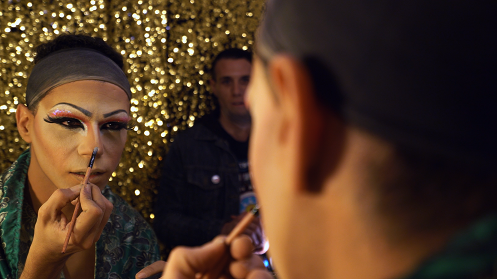Hipbeat, produced and directed by Samuel Key Forrest, gives important screen time to the fictitious theory of the gender binary and emphasises the importance of identity exploration.
It is a deeply personal film depicting Angus’ (played by Samuel Key Forrest) journey of self-exploration and acceptance in modern-day Berlin.
When Angus was young, his father left him and his mother. Angus feels disconnected from his family and breaks away from them after asking for money, which they refuse to give. He thinks they see him as a failure.
The film discusses polyamorous and open relationships, communication and love. He is involved in a far-left political activist group and has a girlfriend called Angie. Their relationship goes on a hiatus after he admits he has been sleeping with several other people whilst seeing her. Both Angie and Angus frequent the Berlin club scene, and the film contains a lot of drug use. Near the end Angus is seen meeting his Mum in a detention centre, at which point they seem to reconnect.
The film creates an important space, showcasing male vulnerability and identity exploration, a rare theme in cinema. Its personal nature invites the viewer into the space to explore and think about important topics that society sometimes shunned. Open relationships and the theme of trust are impartially explored. One scene I particularly liked was the shot of Angus and Angie together; the viewer sees them talking together via a reflection in the train window. This shot invites the viewer to enter the film, creating an intimate space while emphasising the vulnerability and similarity of human experience.
The timing in the film is confusing despite time phrases occasionally being featured in the film. Plenty happens in Hipbeat, and I found it hard to situate myself in a specific duration of time. The film is set in the modern age, and Angus frequently describes fighting against the fascists as part of his unspecified political group. The lack of clarification about this group is problematic. Using the description of ‘fascist’ to describe a government that is not described but which we can infer is a present-day government is problematic. The lack of elucidation could function as an emphasis on the covert nature of this group. However, I believe it causes the film to lose power; the viewer is reluctant to sympathise with a character whose political activities are unstated and suspicious.
Many shots show Angus painting graffiti. This is an important motif in the film. It gives Angus space to be alone and reflective, providing the film with a metaphor for individuals trying to live within pre-defined societal constructs (symbolised by the buildings). The characters try to mould society to fit their lives, as expressed through the painting of public buildings. Angus is arrested for graffiti, which symbolises the barriers society places before people. However, Angus steals the paint for the graffiti. The film hints the graffiti is linked to his membership in the political group, which further encourages the viewer to question what kind of character Angus is politically.
The narrative circle of the film is created through the loss and finding of his father, mother and girlfriend. On the one hand, the central circle is the loss and finding of his father. However, this is problematic as it seems to have little relation to the rest of the film; the father is never shown on screen. This creates a strange disconnect. On the other hand, the loss and finding of his father could symbolise the exploration of his masculinity, yet I still struggled with this part and did not think it was developed enough. There are also a few embarrassing moments, such as the exclamation that ‘On the Road’ is Angus’ favourite book, a cliché favourite for anarchist individuals that has been overdone. Also, when Angus was trying on a dress, the argument between Angus and Angie came across as inauthentic, particularly Angie’s reaction to Angus’ confession that he has been sleeping with other people. The scene lacked shock and emotion, which I would expect from this revelation.
Despite this, the film is important. I recommend you watch it; it encourages self-exploration, talks about the importance of communication, and emphasises how the fallacious gender binary theory affects our society.
The film left me hopeful at the prospect of a world of ‘connection without judgement’, which is significant because, as Angus said, ‘Divided, we fall into fear. Connected, we rise.’
Image courtesy of Strike Media

